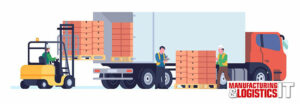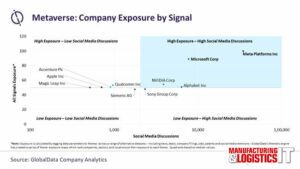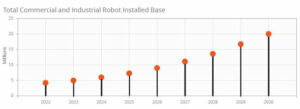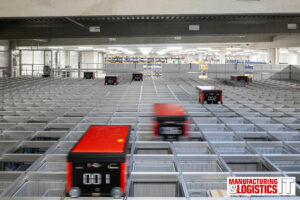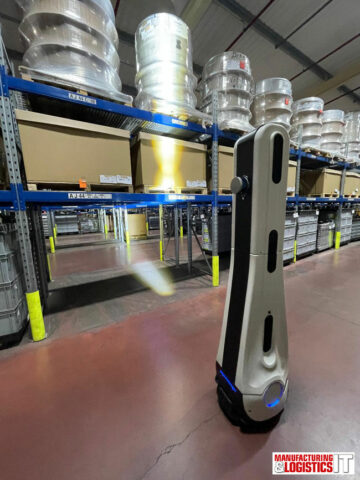 Zebra Technologies Corporation, the digital solution provider enabling businesses to intelligently connect data, assets, and people, has found that warehousing operators are getting serious about a range of artificial intelligence (AI) technologies, as industry disruption looms large, according to the Zebra 2023 Making Modern Warehousing a Reality: Supply Chain Resiliency & Agility research paper.
Zebra Technologies Corporation, the digital solution provider enabling businesses to intelligently connect data, assets, and people, has found that warehousing operators are getting serious about a range of artificial intelligence (AI) technologies, as industry disruption looms large, according to the Zebra 2023 Making Modern Warehousing a Reality: Supply Chain Resiliency & Agility research paper.
The research indicates in the next five years, most global warehousing decision-makers plan to invest in machine learning (94%), predictive analytics (92%), machine vision (86%), and computer vision (85%). These advanced AI technologies provide leading automation, analytics, and digital decision-making capabilities across the supply chain and warehouse floor. Warehouse decision-makers are accelerating technology investment plans to overcome supply chain challenges around labour optimisation, streamlining workflow processes, inventory inaccuracy, and the move to cloud-based systems.
Following a year of inflationary pressures and ongoing labour hiring and retention challenges, the latest black swan event to hit global supply chains comes with the Panama Canal drought, with ships expecting to face up to 20-day delays, reduced daily crossings, and crossing fees more than doubling. The canal accounts for 3% of global maritime trade. The knock-on effects could include higher shipping fees, delayed deliveries to ports, alternative transport routes needed, and empty shelves. Supply chain problems will be felt more acutely at this time of year, following a Black Friday, Cyber Monday, and festive shopping peak, leaving retailers and warehouse operators uncertain about consumer spending and risks another year of over or under-stocking.
“Warehouse decision-makers are embracing AI supply chain and warehouse modernisation solutions in the face of what feels like never-ending disruptions and black swan events,” said Andre Luecht, Global Strategy Lead, Warehouse, Transportation and Logistics, Zebra Technologies. “Cloud-based systems, AI, analytics, and digital twins are giving warehouse leaders the visibility, flexibility, and resiliency they need in today’s world, where supply chains are global, complex, and disrupted. But these solutions shouldn’t be seen in a silo or as a silver bullet. It’s better to implement when appropriate, as part of a visible and flexible ecosystem.”
 Zebra’s research also highlights the growing demand and urgency for sensor technology in 2024 among global decision-makers, including passive radio frequency identification (RFID) tags and sensors (81%), active tag real-time location technology (68%), mobile sensors on forklifts (68%), and temperature monitoring and smart labels (67%).
Zebra’s research also highlights the growing demand and urgency for sensor technology in 2024 among global decision-makers, including passive radio frequency identification (RFID) tags and sensors (81%), active tag real-time location technology (68%), mobile sensors on forklifts (68%), and temperature monitoring and smart labels (67%).
“The nature of disruptions and black swan events can be difficult to control, but we should be working toward being able to better predict, anticipate, mitigate, and respond before these things happen, to minimise and eliminate negative impacts on supply chain and warehouse operations,” said Luecht.
- SEO Powered Content & PR Distribution. Get Amplified Today.
- PlatoData.Network Vertical Generative Ai. Empower Yourself. Access Here.
- PlatoAiStream. Web3 Intelligence. Knowledge Amplified. Access Here.
- PlatoESG. Carbon, CleanTech, Energy, Environment, Solar, Waste Management. Access Here.
- PlatoHealth. Biotech and Clinical Trials Intelligence. Access Here.
- Source: https://www.logisticsit.com/articles/2024/01/23/zebra-study-warehouse-operators-get-serious-about-ai,-as-industry-disruption-looms
- :has
- :where
- $UP
- 200
- 2023
- 2024
- 250
- a
- Able
- About
- accelerating
- According
- Accounts
- across
- active
- advanced
- AI
- also
- alternative
- among
- analytics
- and
- andre
- Another
- anticipate
- appropriate
- ARE
- around
- artificial
- artificial intelligence
- Artificial intelligence (AI)
- AS
- Assets
- At
- Automation
- BE
- before
- being
- Better
- Black
- Black Friday
- Black Swan Events
- businesses
- but
- CAN
- capabilities
- chain
- chains
- challenges
- comes
- complex
- computer
- Computer Vision
- Connect
- consumer
- control
- CORPORATION
- could
- crossing
- cyber
- cyber monday
- daily
- data
- Decision Making
- decision-makers
- Delayed
- delays
- Deliveries
- Demand
- difficult
- digital
- Digital twins
- Disruption
- disruptions
- doubling
- Drought
- ecosystem
- effects
- eliminate
- embracing
- empty
- enabling
- Ether (ETH)
- Event
- events
- expecting
- Face
- feels
- Fees
- felt
- five
- Flexibility
- flexible
- Floor
- following
- For
- found
- Frequency
- Friday
- get
- getting
- Giving
- Global
- Growing
- happen
- higher
- highlights
- Hiring
- Hit
- HTTPS
- Identification
- Impacts
- implement
- in
- include
- Including
- indicates
- industry
- Inflationary
- Inflationary pressures
- Intelligence
- inventory
- Invest
- investment
- jpg
- Labels
- Labour
- large
- latest
- lead
- leaders
- leading
- learning
- leaving
- like
- location
- logistics
- machine
- machine learning
- machine vision
- Making
- Maritime
- minimise
- Mitigate
- Mobile
- Modern
- modernisation
- Monday
- monitoring
- more
- most
- move
- Nature
- Need
- needed
- negative
- next
- of
- on
- ongoing
- Operations
- operators
- or
- over
- Overcome
- Panama
- Paper
- part
- passive
- Peak
- People
- plan
- plans
- plato
- Plato Data Intelligence
- PlatoData
- ports
- predict
- predictive
- Predictive Analytics
- problems
- processes
- provide
- provider
- Radio
- range
- real-time
- Reality
- Reduced
- research
- Respond
- retailers
- retention
- risks
- routes
- Said
- seen
- sensor
- sensors
- serious
- shelves
- Shipping
- ships
- Shopping
- should
- Silver
- smart
- solution
- Solutions
- Spending
- Strategy
- streamlining
- Study
- supply
- supply chain
- Supply Chain Challenges
- Supply chains
- swan
- Systems
- TAG
- Technologies
- Technology
- than
- that
- The
- the zebra
- These
- they
- things
- this
- time
- to
- today’s
- toward
- trade
- transport
- transportation
- Twins
- Uncertain
- urgency
- visibility
- visible
- vision
- Warehouse
- Warehouse Operations
- Warehousing
- we
- What
- when
- will
- with
- workflow
- working
- world
- year
- years
- Zebra
- Zebra Technologies
- zephyrnet

